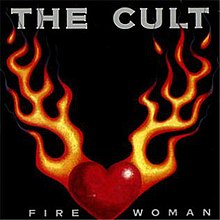Fire Woman
This article needs additional citations for verification. (March 2018) |
| "Fire Woman" | ||||
|---|---|---|---|---|
 | ||||
| Single by the Cult | ||||
| from the album Sonic Temple | ||||
| B-side | "Automatic Blues" | |||
| Released | 13 March 1989 | |||
| Recorded | Late 1988 | |||
| Genre | Glam metal[1] | |||
| Length | 5:11 | |||
| Label | Beggars Banquet | |||
| Songwriter(s) | ||||
| Producer(s) | Bob Rock | |||
| The Cult singles chronology | ||||
| ||||
"Fire Woman" is a song by British rock band the Cult, written by singer Ian Astbury and guitarist Billy Duffy. It was the first single released from their fourth studio album, Sonic Temple, and was subsequently featured on all of the Cult's compilation/greatest hits albums, as well as being a steady fixture of the band's live performances.
"Fire Woman peaked at No. 2 on the US Billboard Modern Rock Tracks chart and No. 46 on the Billboard Hot 100. It also reached No. 1 on New Zealand's Recorded Music NZ (then RIANZ) chart and No. 15 on the UK Singles Chart. Two remixed versions of the song were released as B-sides or promos—the "LA Rock Mix" and the "NYC Rock Mix". Astbury claims the eponymous "fire woman" is a universal symbol, along the lines of a primary element.[2]
Crush 40, best known for their contributions to Sega's Sonic the Hedgehog video game series, featured a cover of "Fire Woman" as the ninth track of their 2009 compilation album The Best of Crush 40 - Super Sonic Songs, and the tenth in their first live album Live!.
Track listings[]
UK 7-inch single
- A Side: "Fire Woman"
- B Side: "Automatic Blues"
UK 12-inch single
- A Side: "Fire Woman", "Automatic Blues"
- B Side: "Messing Up the Blues"
- A Side: "Fire Woman (LA Rock Mix)"
- B Side: "Fire Woman (NYC Rock Mix)"
Charts and certifications[]
Weekly charts[]
|
Year-end charts[]
Certifications[]
| |||||||||||||||||||||||||||||||||||
In popular culture[]
- The song been used during the closing credits of every Australian broadcast of the Formula One season since 2007.[2]
- The song was used in the 2013 Doctor Who episode "Journey to the Centre of the TARDIS".
- The song, along with its video, was featured in the first episode of the second season of Beavis and Butt-Head.
References[]
- ^ "Ten Underrated Hair Metal Bands of the 80s and 90s, and Their Best Songs for Stripping". MetalSucks. 22 September 2011. Retrieved 14 March 2021.
- ^ Jump up to: a b "Fire Woman by The Cult". Songfacts. Retrieved 18 March 2018.
- ^ "Australian-charts.com – The Cult – Fire Woman". ARIA Top 50 Singles. Retrieved 18 March 2018.
- ^ "Top RPM Singles: Issue 6338." RPM. Library and Archives Canada. Retrieved 18 March 2018.
- ^ "Eurohart Hot 100 Singles" (PDF). Music & Media. Vol. 6 no. 15. 15 April 1989. p. 16. Retrieved 5 September 2020.
- ^ "The Irish Charts – Search Results – Fire Woman". Irish Singles Chart. Retrieved 18 March 2018.
- ^ "Dutchcharts.nl – The Cult – Fire Woman" (in Dutch). Single Top 100. Retrieved 18 March 2018.
- ^ "Charts.nz – The Cult – Fire Woman". Top 40 Singles. Retrieved 18 March 2018.
- ^ "Official Singles Chart Top 100". Official Charts Company. Retrieved 18 March 2018.
- ^ "The Cult Chart History (Hot 100)". Billboard. Retrieved 18 March 2018.
- ^ "The Cult Chart History (Alternative Airplay)". Billboard. Retrieved 18 March 2018.
- ^ "The Cult Chart History (Mainstream Rock)". Billboard. Retrieved 18 March 2018.
- ^ "End of Year Charts 1989". Recorded Music NZ. Retrieved 26 September 2019.
- ^ "Canadian single certifications – The Cult – Fire Woman". Music Canada. Retrieved 26 September 2019.
External links[]
- 1989 singles
- 1989 songs
- Beggars Banquet Records singles
- The Cult songs
- Number-one singles in New Zealand
- Song recordings produced by Bob Rock
- Songs written by Billy Duffy
- Songs written by Ian Astbury